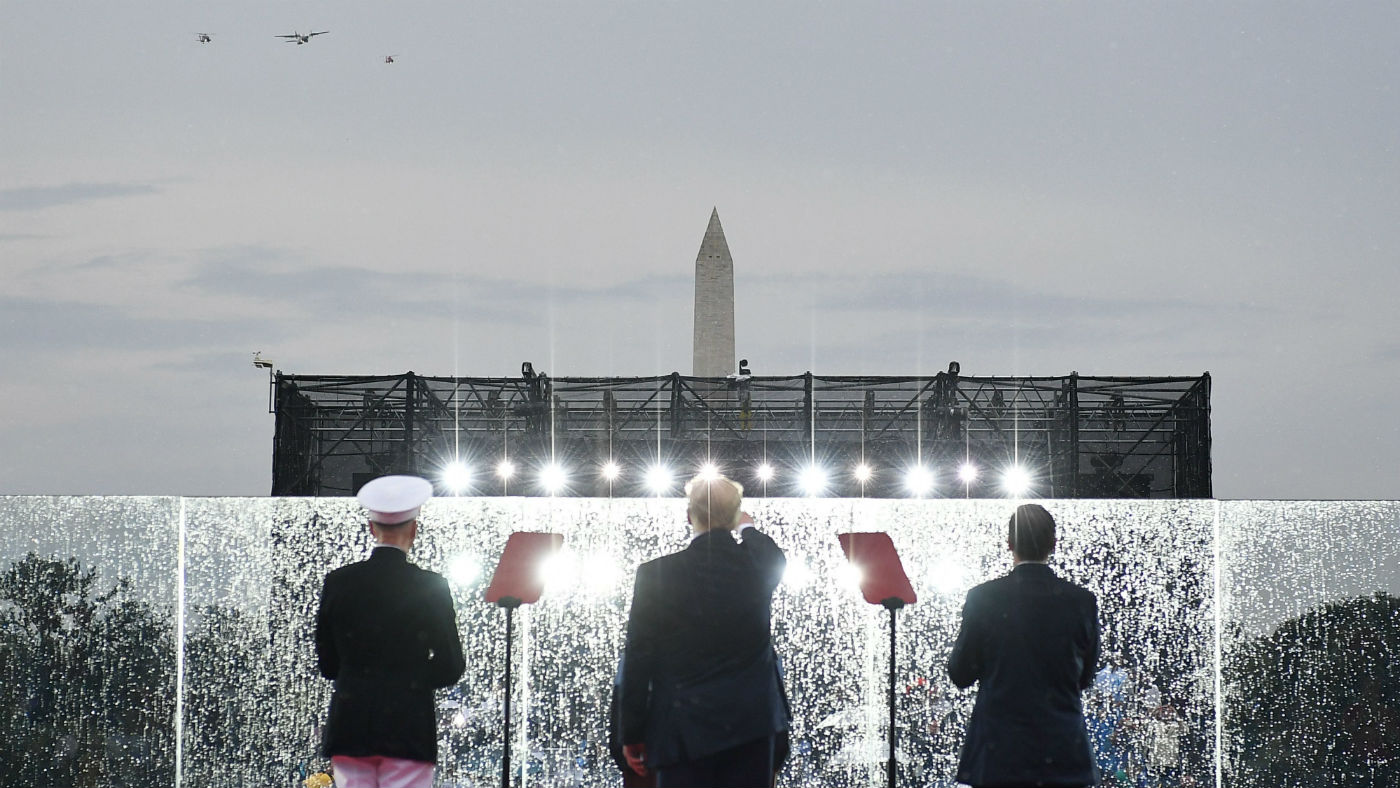The four weirdest moments in Donald Trump’s 4 July speech
Unprecedented focus on military might made for an occasionally surreal spectacle

A free daily email with the biggest news stories of the day – and the best features from TheWeek.com
You are now subscribed
Your newsletter sign-up was successful
This year’s Fourth of July celebrations in Washington were a truly memorable affair as President Donald Trump put his personal stamp on proceedings.
In contrast to his predecessors, George W. Bush and Barack Obama, who celebrated Independence Day with “discreet events on the South Lawn of the White House”, Trump’s “Salute to America” on the capital’s National Mall paid extravagant tribute to the military, says CNN.
Although Trump “did not fulfil his critics’ worst fears of a politically partisan, campaign-style rally”, says The Guardian’s David Smith, his “unique interpretation of the declaration of independence was on full display” during the bombastic parade, which put the president himself at the centre.
The Week
Escape your echo chamber. Get the facts behind the news, plus analysis from multiple perspectives.

Sign up for The Week's Free Newsletters
From our morning news briefing to a weekly Good News Newsletter, get the best of The Week delivered directly to your inbox.
From our morning news briefing to a weekly Good News Newsletter, get the best of The Week delivered directly to your inbox.
The message? “All men are created equal. But one is created more equal than others. And his name is Donald Trump,” Smith states.
Here are four of the strangest moments in this most unusual - and divisive - of Independence Day extravaganzas:
The flyboys of 1775
Trump embarked on a lengthy overview of the War of Independence, reports the Guardian: “In June of 1775, the Continental Congress created a unified Army out of the Revolutionary Forces encamped around Boston and New York, and named after the great George Washington, commander in chief.”
A free daily email with the biggest news stories of the day – and the best features from TheWeek.com
According the current Commander-in-Chief, the plucky colonial force “manned the air, it rammed the ramparts, it took over the airports” - a neat trick in 1775, well over a century before the Wright brothers unveiled the first working aeroplane, in 1903.
The longest day
Immediately after the aviation gaffe, Trump continued with his somewhat garbled rendition of US history, as he said of Washington’s army: “It did everything it had to do, and at Fort McHenry, under the rockets’ red glare it had nothing but victory. And when dawn came, their star-spangled banner waved defiant.”
The remark was a riff on the lyrics of the American national anthem - a suitably patriotic choice, but unfortunately not a historically accurate one.
The battle that inspired Francis Scott Key’s poem Defence of Fort M’Henry, later set to music as The Star-Spangled Banner, did not take place during the War of Independence, but almost 40 years later, during the War of 1812.
The 51st state
Contrary to some predictions, Trump “largely stuck to his script, avoiding diversions into his agenda or re-election campaign”, says Time - with “one exception”.
In a seemingly extemporaneous remark as he discussed the nation’s future endeavours, the president told the audience: “Very soon, we will plant the American flag on Mars.”
In reality, a manned mission to Mars remains “a distant goal not likely to be achieved until late in the 2020s if even then”, says the magazine.
Tanks on the lawn
Perhaps the most controversial element of Trump’s patriotic address was not the speech itself, but the military pageantry that surrounded it. Tanks, fighter jets, troops and martial music played the starring role in the Salute to America.
“Trump used his time on stage to give shout-outs to each of the U.S. military branches... with accompanying fly-overs for each branch,” says People.
Some commentators found the unprecedented focus on military hardware - apparently inspired by Trump’s visit to France during Bastille Day celebrations - an unnerving development.
Congresswoman Eleanor Holmes Norton was among those bemoaning the militarised nature of the event.
“Nothing could be more incongruous than seeing tanks on our Mall,” Norton, a Democrat, told CNN.